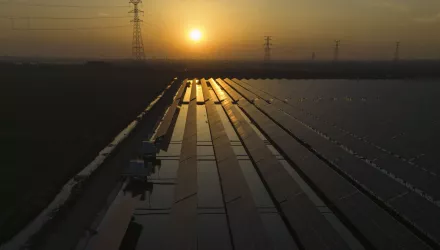Abstract
Global efforts to address climate change appear headed on a collision course with strategic self-interest and great power politics. Nowhere are these tensions more evident than at the nexus of climate and trade policy. In the United States, now the world’s largest producer of oil and gas, President Donald J. Trump is systematically reversing policy advances of the previous administration and seeking to actively impede the energy transition while deploying controversial trade measures to achieve a number of strategic priorities. China, the world’s largest greenhouse gas emitter, has secured a commanding position across all major low-carbon technology supply chains, relying on decades of state intervention to build an unrivalled scale and cost advantage in manufacturing. Yet in that process, China has prompted growing concern among its trade partners about excessive supply chain dependencies and the impacts of China’s export-dependent economy on the competitiveness of its trade partners’ domestic industries. Meanwhile, Europe finds itself in an increasingly difficult position as the geopolitical landscape evolves, having historically relied on a now increasingly withdrawn U.S. for military security and increasingly for its remaining fossil fuel needs, while at the same time seeking to sustain its ambitious decarbonization roadmap in the face of growing economic pressures and electoral backlash. How will evolving political dynamics and national interest affect the pace and direction of decarbonization efforts, including international climate cooperation? How do trade and the cross-border flow of goods, services, capital and knowledge shape national priorities? Exploring a number of possible short- to medium-term scenarios, this paper argues that climate policy stands at a crossroads, with a greater than usual range of possible outcomes threatening to upend conventional expectations about climate leadership and the interplay of domestic and international climate policy dynamics.
Background
The paper was written as part of a larger project on climate-change and trade policy supported by Energy Foundation China (EFC). The Harvard Project conducted a research workshop and policy roundtable on this topic in Shanghai December 16 – 17, 2024. The workshop was co-sponsored by the Center for International Knowledge on Development (CIKD), a research institute affiliated with the Development Research Center of China’s State Council. More on the workshop is here. Mehling wrote a background brief for the Shanghai workshop that can be downloaded here.
The author made significant revisions to the first released version of this paper (March 2025), based on events and additional input. The revised version (April 2025) may be downloaded using the red buttons above on this web page.
Michael Mehling is a Professor at the University of Strathclyde School of Law and Deputy Director of the Center for Energy and Environmental Policy Research at the Massachusetts Institute of Technology.






